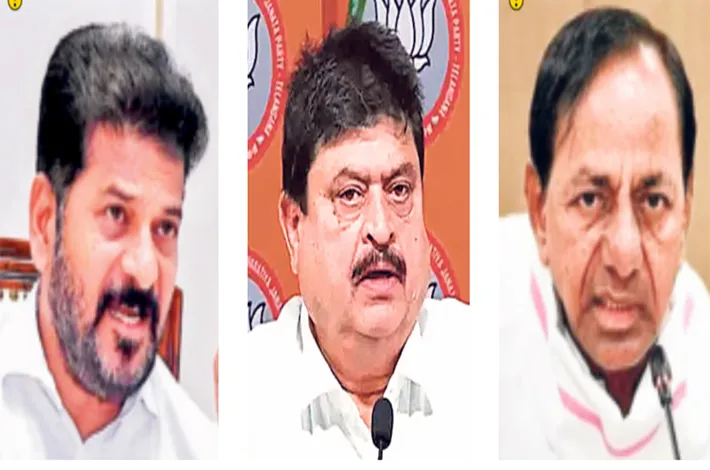Rs 1.07 Crore heist exposes deeper rot
16-10-2025 12:00:00 AM

Black money shadows Telangana’s education sector
■ In Telangana alone, over 1,200 engineering colleges dot the landscape, with more than half linked to political families
■ These colleges serve dual purposes: generating legitimate revenue through fees while providing a conduit to "whiten" black money.
■ Fees collected in cash—often from rural students without banking access—can be underreported
■ Institutions declare inflated expenses or understate incomes, routing black money through fake donations or vendorpayments
■ In Tamil Nadu, a prominent educational group admitted to Rs 532 crore in undisclosed income during a 2020 tax raid
A 2024 LinkedIn analysis estimated that nearly 90% of private universities are controlled by politicians or their kin
metro india news I hyderabad
In a brazen midnight burglary that has sent shockwaves through Telangana's academic circles, thieves made off with Rs 1.07 crore in cash from the administrative office of the Brilliant Institute of Engineering and Technology in Abdullapurmet, on the outskirts of Hyderabad. The incident, reported on October 10, has not only triggered a high-stakes police investigation but also reignited debates over the shadowy nexus between politicians, officials, black money, and private educational institutions. With the college owned by a sitting Congress MLA, questions are mounting: Why was such a massive sum of unbanked cash—allegedly students' fee collections—stashed in an office safe, and what does this reveal about the underbelly of India's education sector?
The theft unfolded under the cover of darkness around 2 a.m., when unidentified burglars scaled the college perimeter wall, smashed through a window, and targeted the principal's office. They rifled through an almirah, prying open a steel locker to extract bundles of currency notes totaling Rs 1.07 crore, along with a digital video recorder (DVR) containing crucial CCTV footage. By morning, when administrative staff arrived, the heist was discovered, prompting an immediate FIR at the Abdullapurmet police station under sections for burglary and theft.
Police have launched a full-scale probe, deploying forensic teams to dust for fingerprints and recovering partial CCTV clips from external cameras showing shadowy figures fleeing the scene. "We are analyzing every frame and following leads on potential insider involvement," said a senior officer from the Cyberabad police commissionerate, speaking anonymously. The college management, however, has offered explanations that have drawn skepticism.
Officials claimed the cash represented "pending fee collections from over 1,000 students" for the ongoing academic year, insisting it was temporarily stored due to "banking delays over the weekend." Critics, including local activists, dismiss these as "lame excuses," pointing out that digital payments and banking norms make such hoarding unnecessary in 2025.
At the heart of the controversy is the college's ownership: Brilliant Institute is run by the Brilliant Educational Society, headed by Kasireddy Rajendra Reddy, the Congress MLA from Kalwakurthy constituency. Reddy, a two-term legislator with interests in real estate and education, is no stranger to such ventures. This incident fits a disturbing pattern where politicians, often accused of amassing wealth through land grabs, liquor syndicates, and real estate mafias, funnel ill-gotten gains into political coffers and educational empires.
Across India, the proliferation of private colleges owned by elected representatives has long been a red flag for money laundering. A 2024 LinkedIn analysis estimated that nearly 90% of private universities are controlled by politicians or their kin, leveraging vast untraceable funds to establish these institutions. In Telangana alone, over 1,200 engineering colleges dot the landscape, with more than half linked to political families, according to a state education department audit from 2023. These setups, spanning junior colleges, engineering schools, medical institutes, and coaching centers, serve dual purposes: generating legitimate revenue through fees while providing a conduit to "whiten" black money.
Experts argue that educational trusts offer the perfect veil. Fees collected in cash—often from rural students without banking access—can be underreported, allowing discrepancies to absorb undeclared funds. "It's a classic laundering mechanism," says Dr. Meera Nair, an economist at the Tata Institute of Social Sciences. "Institutions declare inflated expenses or understate incomes, routing black money through fake donations or vendor payments.
" A 2016 Income Tax Department crackdown unearthed Rs 32,000 crore in black money across sectors, with education and real estate topping the list for evasion tactics. More recently, the Enforcement Directorate (ED) probed 22 Uttar Pradesh institutes in 2023 for siphoning Rs 75 crore in scholarship funds, revealing a web of shell companies and benami accounts. In Tamil Nadu, a prominent educational group admitted to Rs 532 crore in undisclosed income during a 2020 tax raid.
This cash hoard isn't just for accounting sleight-of-hand; it's electoral ammunition. Politicians like Reddy donate crores to party funds, using colleges as "currency stock points" to stockpile liquid assets for vote-buying sprees. During the 2024 Lok Sabha elections, the Election Commission of India (ECI) recorded the highest-ever seizures of inducements—Rs 9,000 crore worth of cash, liquor, drugs, and metals—surpassing the 2019 tally by over 150%. Drugs alone accounted for 45% (Rs 3,958 crore), but cash seizures hit Rs 1,000 crore in the recent Maharashtra and Jharkhand assembly polls—a sevenfold jump from 2019. Despite ECI guidelines mandating cVigil apps for reporting and flying squads for checks, insiders say the "major transfers" evade detection through midnight drops and proxy distributors.
The private educational institutions owners, promoters used their institutions vehicles, buses for the transportation of the currency. Most of the times they are left scot free even when caught, they claim the money is meant for the institution’s. Often these institutions are used a cover up to transport the illegal money in a big way!
The Telangana case mirrors nationwide malaise. In Andhra Pradesh, a 2025 exposé revealed politicians' colleges as "black money empires," with liquid cash funnelled to election war chests. Himachal Pradesh's education sector has been dubbed a "safe haven" for whitening funds since 2012. Even in Maharashtra, ED attached Rs 8 crore in assets linked to black money in educational ventures just last month. "These institutions aren't just schools; they're vaults for the corrupt," tweeted a Hyderabad-based RTI activist, echoing sentiments on X where posts about the Brilliant heist have surged, with users demanding transparency.
As the Abdullapurmet probe intensifies—with Reddy's name surfacing in preliminary questioning—calls for systemic overhaul grow louder. Opposition leaders, including BJP's Bandi Sanjay Kumar, have urged Governor Jishnu Dev Varma to institute a high-level commission, headed by a sitting or retired High Court judge, to scrutinize all politician-owned colleges in Telangana. "A thorough audit of finances, ownership, and cash flows is essential," Kumar said in a statement. "This isn't isolated; it's a state-wide scam eroding public trust."
Civil society echoes this. The Citizens for Accountability Forum plans a protest march next week, demanding mandatory digital fee collection and third-party audits for all private institutes. "If the Revanth Reddy government is serious, act now," forum convenor Lakshmi Devi implored. "ECI seizures are drops in the ocean; real control lies in choking the sources—like these cash-laden campuses."
Yet, challenges abound. Political funding remains opaque post the 2024 Supreme Court ruling scrapping electoral bonds, which PM Narendra Modi warned could drive more "black money" underground. With by polls looming in Telangana, the stakes are high. The Brilliant heist, far from a mere robbery, peels back layers of a festering issue: how India's democracy is bought, one crore at a time.
As police chase ghosts in the night, the real culprits may lurk in plain sight—behind podiums and principal's desks. Until a judicial probe pierces the veil, the cycle of theft, laundering, and electoral excess will persist, leaving students' futures—and the nation's integrity—in jeopardy.








